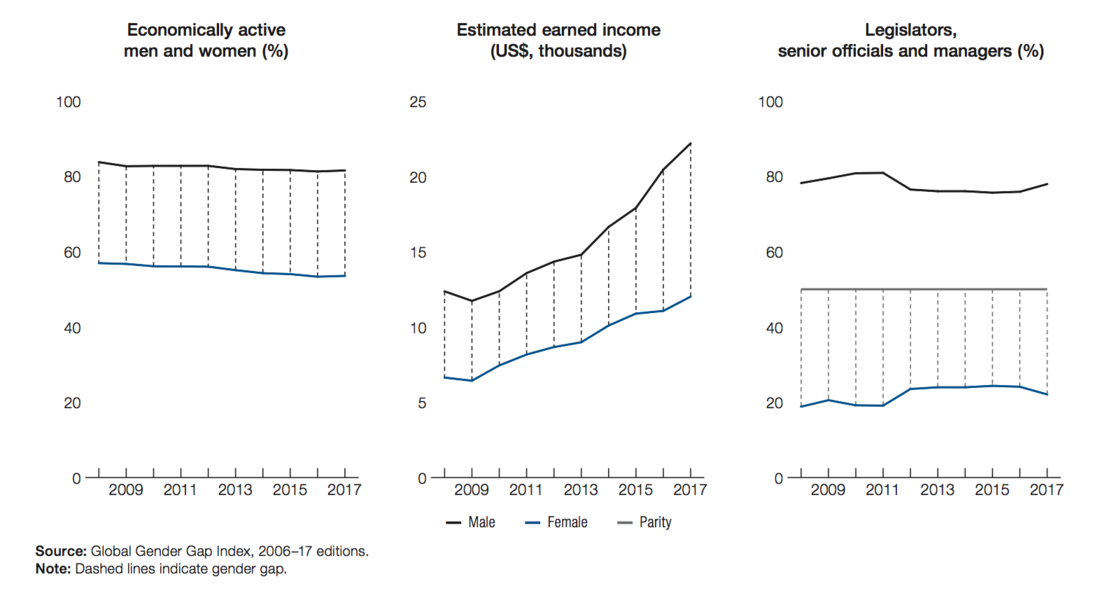男女收入差距仍在擴(kuò)大,實(shí)現(xiàn)兩性職場平等需要217年
|
最近一系列性騷擾指控的矛頭都直指位高權(quán)重的男士,。如果說指控有什么含義,,應(yīng)該就是女性在爭取職場平等待遇方面征途漫漫。本周四,,世界經(jīng)濟(jì)論壇(WEF)預(yù)測了一個(gè)問題解決的具體時(shí)限,。各位女士,你們還得奮斗217年,。 WEF新近發(fā)布的《2017年全球性別差距報(bào)告》考慮到了多方面因素,,將女性的經(jīng)濟(jì)活動(dòng)參與度和機(jī)會(huì)、受教育程度,、健康和生存狀況,、政治賦權(quán)與男性對比。報(bào)告發(fā)現(xiàn),,在報(bào)告發(fā)布以來覆蓋的106個(gè)國家中,,如果要在以上四方面都實(shí)現(xiàn)男女平等需要整整一百年,,比去年該報(bào)告的預(yù)估時(shí)間長了十七年。 如果只考慮經(jīng)濟(jì)層面,,女性要趕上男性還需要更久,,得花217年。這是因?yàn)?,考慮勞動(dòng)力參與率,、薪資差距和在專業(yè)領(lǐng)域的領(lǐng)導(dǎo)地位,女性在經(jīng)濟(jì)方面的性別差距非但沒有縮小,,反而還在擴(kuò)大,。事實(shí)上,在2013年達(dá)到史上巔峰之后再無進(jìn)展,,一直在退步,,今年已退回2008年的水平。 WEF認(rèn)為,,雖然沒有國家能徹底消除經(jīng)濟(jì)方面的性別差距,,但有13個(gè)國家已經(jīng)基本實(shí)現(xiàn)男女平等,將差距縮小了80%左右,。以經(jīng)濟(jì)的指標(biāo)衡量,,非洲小國布隆迪的表現(xiàn)最佳,性別差距減少了91%,。巴巴多斯,、巴哈馬、貝寧分列第二到第四位,,其男女國民在經(jīng)濟(jì)方面的差距分別縮小了88%,、87%和86%。美國排名第19位,,差距收窄了78%,。 從均值看,2017年榜單中各國在經(jīng)濟(jì)方面的男女差距縮小了58%,,之前的2015年和2016年差距均為59%,。 對于女性在經(jīng)濟(jì)方面的不利地位為何進(jìn)一步惡化,WEF的報(bào)告提供了一些線索,。雖然全球男性和女性的勞動(dòng)力參與率都在下降,,但女性的降幅特別大。同時(shí),,雖然兩性的收入都有增加,,但男性漲得更多。報(bào)告指出:“這意味著,,經(jīng)濟(jì)繁榮并沒有平等地惠及男性和女性,?!倍遥栽诠膊块T和企業(yè)界的高層仍沒有足夠的地位:今年女性高層管理者人數(shù)只占22%,。 |
If the recent string of sexual harassment allegations against high-powered men is any indication, women have a long way to go before achieving equal treatment in the workplace. On Thursday, the World Economic Forum pegged a specific time frame to solving the problem, and ladies, it’s going to be a slog: 217 years. The new WEF report on the global gender gap takes into account women’s economic participation and opportunity, educational attainment, health and survival, and political empowerment as compared to men’s. It found that it’ll take exactly 100 years to close the gap across all four factors in the 106 nations included in the report since its inception—17 years longer than last year’s estimate. But taking into account only women’s economic deficiency, it’ll take even longer—217 years. That’s because rather than shrinking, the economic gender gap—which considers women’s labor force participation, wage equality, and professional leadership—continues to widen. In fact, progress on this front reverted back to its 2008 level this year, after peaking in 2013. Not a single country has fully closed its economic gender gap, though 13 have come close, narrowing it 80% or more, according to WEF. The small African nation of Burundi is the top performer by this measure, having closed 91% of its economic gender gap. Barbados, the Bahamas, and Benin are second (88%), third (87%), and fourth (86%) respectively. By comparison, the U.S. is ranked 19th, having narrowed its gap 78%. On average, nations had closed 58% of their economic gender gaps in 2017, down from 59% in both 2016 and 2015. The report offers a few clues as to why the women’s economic disadvantage is getting worse. While global labor force participation is declining for both men and women, the dip has been especially steep for women. At the same time, earned income is on the rise for both sexes, but it’s been especially sharp for men, “suggesting that the growth in prosperity is not equitably distributed along gender lines,” the report says. Plus, women remain underrepresented in senior positions in the public sector and in business: This year, women accounted for just 22% of senior managerial positions. |

|
為了進(jìn)一步推動(dòng)男女平等,,報(bào)告謀劃出鼓舞人心的美好藍(lán)圖:而且會(huì)產(chǎn)生巨大的經(jīng)濟(jì)效益。如果能在2025年以前消除經(jīng)濟(jì)活動(dòng)參與度方面的男女差距,,全球GDP可能增加約5.3萬億美元,。只要在經(jīng)濟(jì)方面實(shí)現(xiàn)男女平等,單單美國的GDP就可能增加1.75萬億美元,。報(bào)告認(rèn)為,,這些數(shù)字意味著,,“假如公共部門增加投入消除全球性別差距,,該項(xiàng)目很可能實(shí)現(xiàn)自給自足?!?(財(cái)富中文網(wǎng)) 譯者:Pessy 審校:夏林 |
The report provides a major incentive to increase efforts on the gender equality front: There’s a ton of money on the line. Closing the economic participation gender gap 25% by 2025 could add some $5.3 trillion to the world GDP. The U.S. alone could see an extra $1.75 trillion by achieving economic gender parity. Those figures, the report says, suggest “the potential self-financing effects of additional public investment into closing global gender gaps.” |













